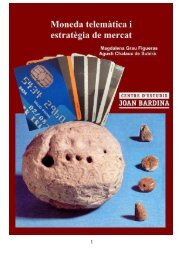Telematic currency and market strategy (mtemuk.pdf). - Centre d ...
Telematic currency and market strategy (mtemuk.pdf). - Centre d ...
Telematic currency and market strategy (mtemuk.pdf). - Centre d ...
You also want an ePaper? Increase the reach of your titles
YUMPU automatically turns print PDFs into web optimized ePapers that Google loves.
can drive us more to the absolute despotism prophesied by orwell <strong>and</strong> huxley than to a world of real liberty<br />
which we all wish.<br />
We therefore must accept the challenge of the telematic revolution, <strong>and</strong> instead of choosing regressive<br />
solutions -which as a matter of fact are not applicable because the phenomenon is irreversible- we must try to<br />
find the real mechanisms which will protect the actual liberties of all the citizens.<br />
In this chapter we will submit two of these mechanisms. They will be considered mainly from a practical<br />
point of view of technical steps to be taken, while the fundamental grounds <strong>and</strong> possible social repercussions<br />
of these mechanism will be treated in detail in another essay.<br />
3. An independent justice, for the protection of the personalized monetary archives.<br />
The control of population is included in the same social-technological development of monetary telematics<br />
which is being introduced, whether we like it or not.<br />
Therefore, the problem to be solved does not depend from control but from the use which will be made of it<br />
<strong>and</strong> from the legitimate authority or illegitimate power which will determine such use.<br />
Among the several social <strong>and</strong> political organizations which could take up this function, we choose here<br />
justicial authority, which, being actually independent from the state, could objectively take in charge the total<br />
monetary archives of the geo-political society.<br />
Justice has no direct control on the present of people <strong>and</strong> it only punishes their documented past. And even<br />
if it is really independent from the state -from the executive <strong>and</strong> the legislative power- it cannot avoid the<br />
severe technical frame of law, from which it depends totally <strong>and</strong> solely.<br />
For these reasons, justice can become the most adequate authority to effectively control:<br />
1. Respect to private secret <strong>and</strong> to personal intimacy to which every person has a right. Private secret<br />
can only be made public in two well defined cases:<br />
a. when there is a written authorization of the person concerned on the document which is<br />
made public;<br />
b. when there is a firm sentence by the court.<br />
2. Respect to professional secrecy, which obliges <strong>and</strong> is a right for every person, whichever his/her<br />
profession.<br />
It would also be advisable that, on the long run, all the teams forming the telematic monetary network -<br />
whether machinery or human teams- should depend from justice.<br />
Justice therefore will be the only institution with an access to the whole of the data recorded by the telematic<br />
monetary network. The right of access of the state <strong>and</strong> of private citizens will be constitutionally limited to<br />
the data of an analytical-statistic type, that is without reference of names nor personal identification.<br />
The fact that justice should be the sole guardian of the telematic monetary information <strong>and</strong> the only authority<br />
to have full access to the network, does not mean that this right of access should be used indiscriminately.<br />
Law should establish that justice can only use the information it guards with reference to a real case of a<br />
process. When an instructing judge has founded reasons to peruse monetary documents related to the case he<br />
has in h<strong>and</strong>, this judge, <strong>and</strong> only he, will be allowed to examine the relevant documents. Only these<br />
documents will be made public in the corresponding court.<br />
It is clear, however, that many will consider deceptive the possibility of a neutral, objective, unselfish justice.<br />
Cases of corruption among the members of judicial authority are not unknown.<br />
42



